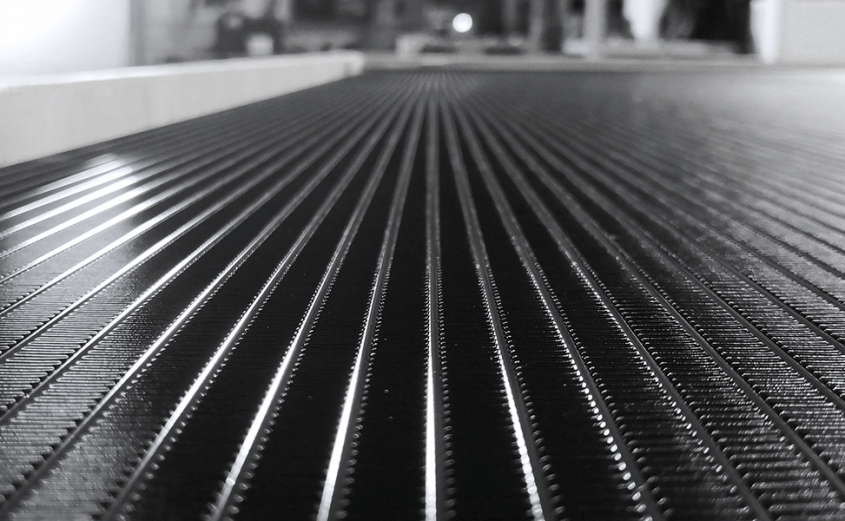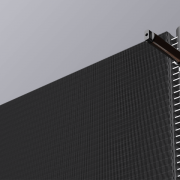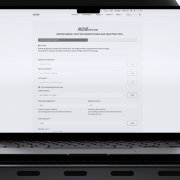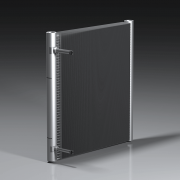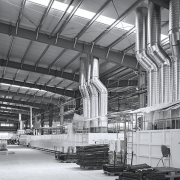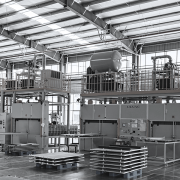A quick guide to OEM replacement coils
Introduction
Microchannel coils have become a mainstay in the HVAC industry for most air-cooled chillers and other air conditioning equipment. Aluminum microchannel heat exchangers (often abbreviated as MCHE or MCHX) offer a line of advantages for both manufacturers and end-users:
- Reduced refrigerant footprint: internal volume of a microchannel condenser is about up to 60% smaller compared to a finned pack coil with copper tubes of the same capacity.
- High corrosion resistance contributes to longer coil service life.
- Lower required fan power draw as air pressure resistance of MCHE coils is low.
- As a cheaper material, aluminum help keep condenser costs down.
- Low weight.
Along with advantages come some issues for end-users. Cost optimization leads to the use of low-quality condenser coils, while design flaws like excessive vibrations or improper selection of aluminum alloys exacerbate this. The result is leaking issues that are inherent in some chiller models. Irregular coil cleaning and/or absence of adequate anti-corrosion treatment when it is required make corrosion and leaking issues much worse.
Failure Statistics
Statistics collected by our sales network for the past 12 months indicate that about 40% of requests for condenser coil replacement relates to York YLAA and YVAA series chillers, 30% referring to Trane RTAF, and 25% – different models of Carrier air-cooled chillers, including 30RB and 30XA.
Fortunately, for all of the above-counted units, simple and inexpensive condenser replacement solutions are there.
Replace or Repair?
The first question to answer is if repair makes sense or replacement of leaking condenser is required.
Repairing the leaked condenser coil is possible but reasonable only in case of single cracks. Found damage can be eliminated using numerous repairing kits available on the market. It is important to find the issue source to avoid further coil degradation. But often, the use of uncoated coil where anti-corrosion coating is a must serves as a reason for early cracks – thus, replacement becomes necessary.
As was briefly indicated above, the most frequent causes of leakages are:
- Use of cheaper condenser coils without protective treatment or coils made from unsuitable aluminum alloys or thin-walled coils.
- Design flaws, e.g., not using appropriate bands and washers to isolate dissimilar metals: aluminum and copper or steel.
- Improper or irregular maintenance and cleaning.
- Excessive unit pipework vibrations or vibrations from fans (in this case, damage affects refrigerant connections).
- Physical coil damages received during unit manufacturing, transportation, installation works, or maintenance.
- Corrosion issues caused by design negligence of possible on-site corrosion sources.
In case of major damages or significant traces of corrosion (this is the most frequent scenario, as single cracks are hard to identify as refrigerant losses are scarcely noticeable), the only sustainable solution is coil replacement.
Replacement Cost
A lot of factors determine the price of microchannel coils, be it custom or OEM replacement coil: from costs of assembling and electricity consumed while brazing in a furnace to skyrocketing prices of raw materials and freight in 2021.
Over the past year, raw materials, including aluminum, have seen a record price increase: aluminum is up about 95%, copper is up over 120%, and both tend to rise in the future. As a consequence, the average cost of replacement increased by 10% compared to 2019.
The cost of installation works is still a small proportion of the total price – in case if replacement coils are fully compatible with OEM ones.
Solution Proven To Work
To address leaking issues and inferior durability of OEM condensers, we developed a line of replacement microchannel coils. OEM replacement coils made by Kaltra have a number of crucial advantages compared to OEM coils. This difference is caused by a number of factors, including:
- The use of high-grade aluminum alloys and coatings to strengthen coil durability and protection against corrosion. The use of HA9153A alloy and zinc arc spray technology guarantees a longer lifespan.
- Electrophoretic epoxy coating (E-coating) enables seamless coil operation in harsh environmental conditions: areas with chemically polluted air, urban zones, or seashore areas. Recommendations for choosing protective coatings can be found in our Selection Guide.
- Proprietary technology for brazed-in connections and the use of sophisticated heat shrink sleeves exclude corrosion caused by contact of dissimilar metals, e.g., aluminum and copper.
- High manufacturing quality with automatic coil core assembly to guarantee minimal tolerances and stable geometry
- Precise brazing in last-generation, state-of-the-art furnaces with a controlled atmosphere
- Three-stage quality control
What’s important, our replacement coils are fully compatible with originals in terms of dimensions, performance, internal volume, making the replacement process quick, easy, and inexpensive.
For OEM replacement coils, it is crucial to keep not only geometry and size but properties like refrigerant- and air-side pressure drops, coil volume, and weight. This guarantees stable HVAC unit operation after condenser replacement. Kaltra replacement coils are completely equal to OEM coils but distinguished by the quality, use of advanced alloys, and, through this, by much longer service life.
When necessary, Kaltra supplies replacement coils enclosed in powder-coated steel cassettes with prefabricated sealing for airtightness, allowance of thermal expansion, and isolation of dissimilar aluminum and steel to prevent corrosion.
Conversion
Some are vote for conversion, the changing microchannel condenser coils with old-fashioned finned pack heat exchangers. However, this translates to technical difficulties, as finned pack coils are hulky and affect chiller operation in general because the amount of refrigerant is much higher for round-tube coils while the heat transfer rate is significantly lower. Moreover, this enlarges chiller weight. The price of such conversion is high, and drawbacks are also loss of system efficiency and still low corrosion resistance.
***
Whether you are looking to replace leaking or damaged coils or replace overaged condensers, Kaltra offers OEM replacements: 100% compatible in size and performance, made from aluminum alloys that guarantee maximum protection against corrosion, with E-coating or TCP coating, and affords customers with supporting installation instructions and drawings, and extended warranty period.
In-stock positions include coils for York YLAA and YVAA series chillers, Trane RTAF, Carrier 30RB and 30XA models, all in uncoated or e-coated versions. Other types of coils are easily available by orders with reasonable lead time. Customers can order condenser coils online or by contacting our team.

